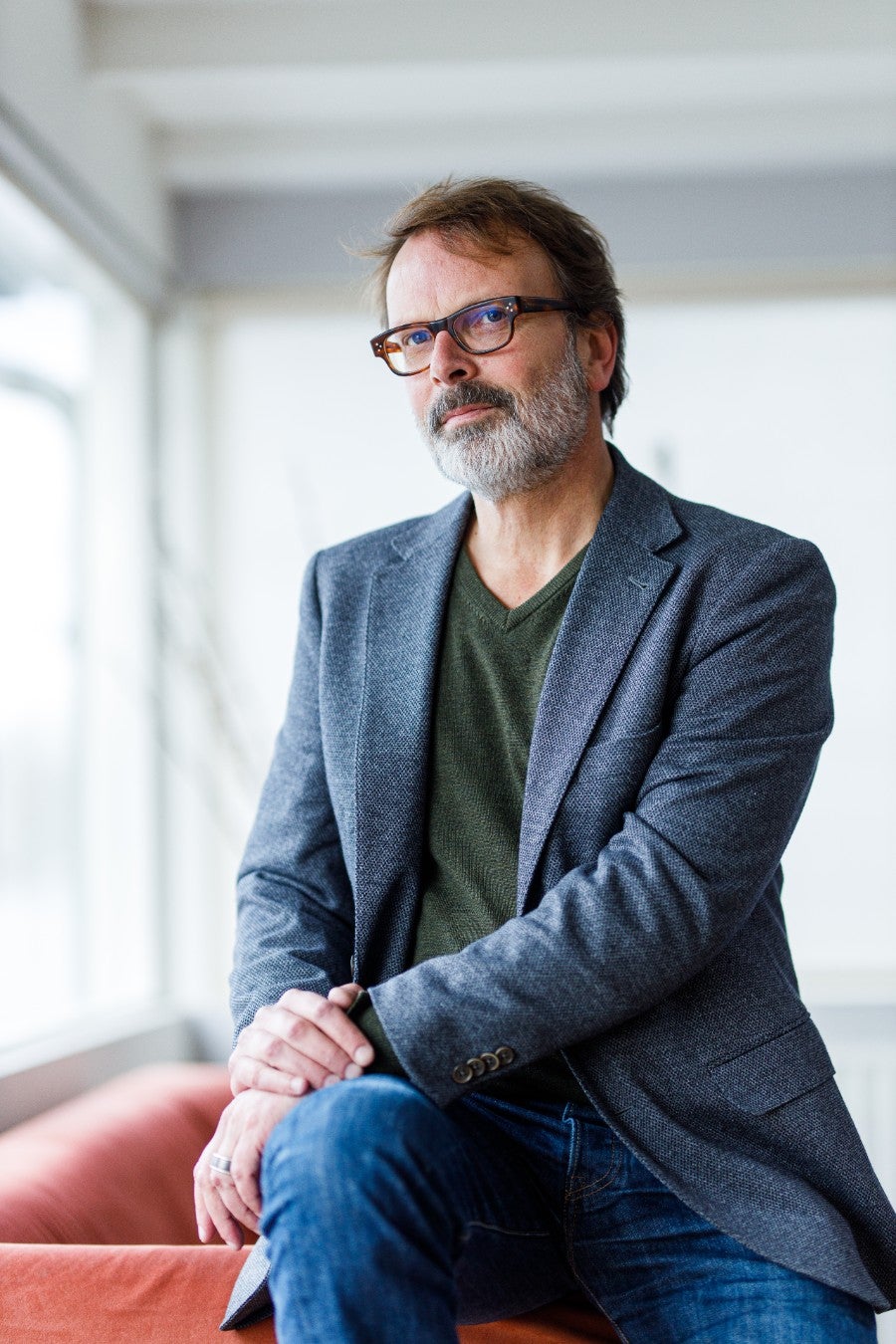Philosopher Hans Schnitzler (51) sets out in his new book Wij nihilisten why we all have such a complex relationship with technology, but find it so hard to free ourselves from it.
We met the philosophy alumnus on his houseboat on the Amstel river to discuss why he doesn’t have a smartphone and why we can’t only point the finger at the tech titans but should also take a good look at ourselves.
Although live interviews used to be the norm, I was still amazed that you suggested meeting live.
„It’s strange how quickly things change isn’t it? For the past two years we’ve all huddled en masse behind our screens and soon we’ll not know any different. The students I teach at Vrije Universiteit were recently asked to choose whether they wanted in-person or hybrid teaching. After all that home education, I’d expected them all to be desperate to get back in the lecture hall. I was amazed that the majority preferred online lectures. But what if you miss out on meeting the love of your life on the way to VU Amsterdam? They hadn’t even considered that."
„We want technology to make life faster and easier. But is such optimisation necessarily better?"
„We want technology to make life faster and easier. But is such optimisation necessarily better? I’m not so sure. Don’t get me wrong, I’m not against screens but we do lose something vital. We don’t only communicate with our faces, we do it with our bodies too. Going virtual means that we only need to use a few senses. I really value being able to experience everything and never walk around listening to music in public spaces."
The tech industry is often accused but we also like what they offer, don’t we?
„That's right. The internet industry is very adept at gluing us to our screens, but we can’t blame the tech industry alone. Technologies strengthen the mental and physical capacities that people already naturally have. A smartphone increases the opportunities for communication and for being seen."
People often seem to be aware of the negative aspects of technology, but you’re probably one of the few without a smartphone.
„We know what the downside is, but as long as we feel that it’s optimising our lives, we keep using it. We really want those likes. You can only observe digital hygiene when you realise that it’s not only the companies that are manipulating us; it’s also something inside us. That’s something we find in the nerd to a large extent: wanting to have control, predictability, convenience, no friction and a tendency to outsource human ability to something outside ourselves."

How can people do that in practice?
We should take a step back, decide what our personal values are and base our use of technology on that. In my book I make the link to nihilism. Ever since Nietzsche’s idea of ‘the death of God’, some have had to look for a sense of meaning within themselves. There’s no longer a higher authority. Nietzsche already warned that this would be hard and technology seems to be taking God’s place. We equate technology with optimisation and this makes us think we can engineer everything. And otherwise we quell that feeling of emptiness through aimless scrolling."
„I suggest that we should engage in self-reflection, despite the discomfort. What do we find important? And how can you shape your life in such a way that you become a wiser person? This helps you develop a register of values and you can then examine how these values relate to themes such as technology and climate. Have your own values lead you, rather than technology."
„I’m not saying we should all give up our smartphones, but a detox can offer valuable insights into the question of what represents a good life."
„I believe in radical experimentation. I’m not saying we should all give up our smartphones, but a detox can offer valuable insights into the question of what represents a good life. I’m also a huge advocate of social work placements. Have those people working at the ZuidAs work in debt relief for a while. This also leads you to the question of what a humane existence is."
What do you think is the worst thing that can happen if we stay on the current path of technology?
„The benefits affair was also a consequence of how people end up being profiled in systems that are hardly transparent. The affair is an extreme hyper-stereotyping without any clarity of what caused it. You reduce people to the data they generate. I’m sometimes afraid that this will turn us into robots, listening dutifully to what the algorithmic oracles tell us. Obediently achieving those 10,000 steps and checking the sleep app to see how we slept. We’ll all start to look alike as we’re fed these data and adjust our lives accordingly."
With all the knowledge you have about the negative sides of technology, could you use your smartphone in a healthy way?
„I’d find it really difficult and would have to set a strict framework for myself so that I didn’t sit watching cat films all day. Not having a smartphone isn’t always easy for me, you know. And I keep ending up on Twitter on my computer too. But I see that as a form of resistance."
Hans Schnitzler, Wij Nihilisten, de Bezige Bij, 18.99 euro, 144 pages.








